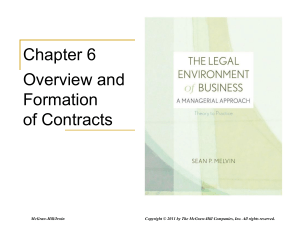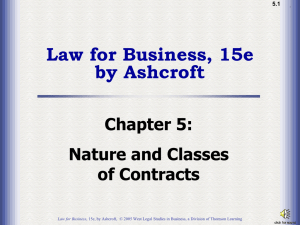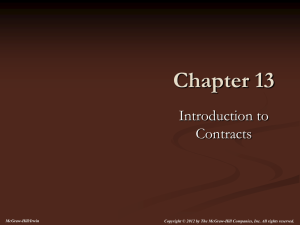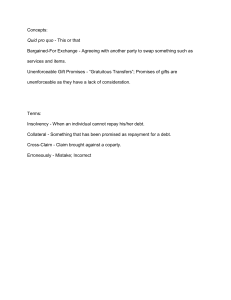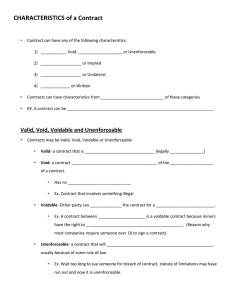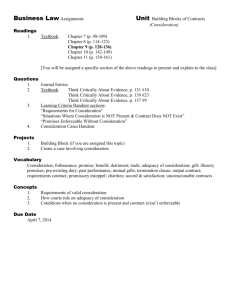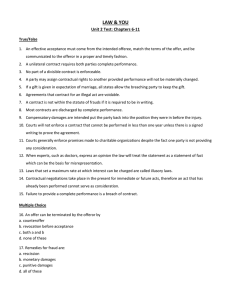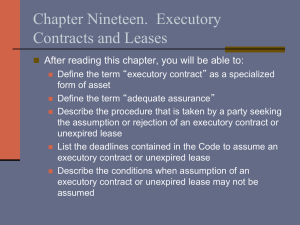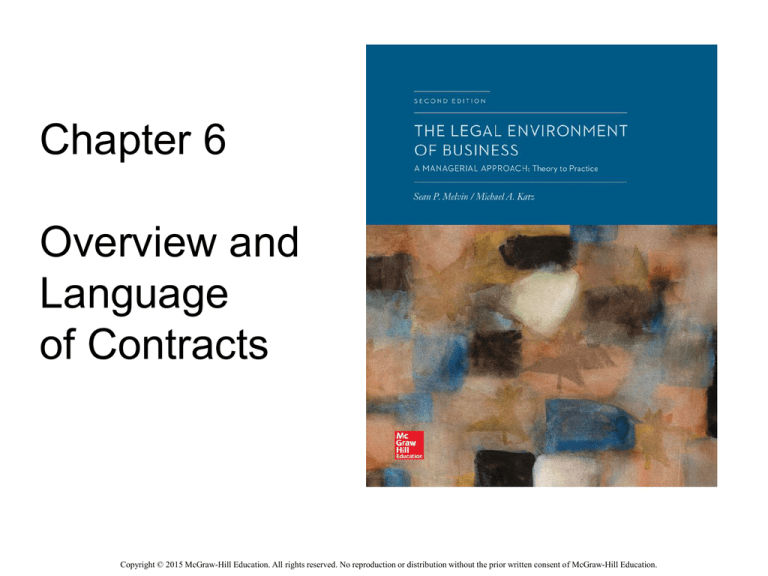
Chapter 6
Overview and
Language
of Contracts
Copyright © 2015 McGraw-Hill Education. All rights reserved. No reproduction or distribution without the prior written consent of McGraw-Hill Education.
Definition of a Contract
• Contracts are enforceable agreements
between the parties.
• One generally accepted definition of a
contract is a promise or a set of promises
enforceable by law.
6-2
Elements of a Contract
• Mutual assent
• Capacity to contract
• Consideration
• Legal purpose
6-3
Sources of Contract Law
• State common law
– Services or Real Estate
• Legal
• Accounting
• Engineering
• State statutory law
– Uniform Commercial Code (UCC)
• Goods
• Leasing of equipment
6-4
Written vs. Oral Contracts
While the word contract is often used to
describe a written document, many
contracts are not in writing and yet are
enforceable.
6-5
Bilateral Contracts vs.
Unilateral Contracts
• A bilateral contract involves two
promises and two performances.
• A unilateral contract involves one
promise, followed by one performance,
which then triggers a second performance.
6-6
Express Contracts vs. Implied
Contracts vs. Quasi-Contracts
• An express contract is created when the
parties have knowingly and intentionally agreed
on the promises and performances.
• An implied contract is one in which the
agreement is reached by the parties’ actions.
• The law permits quasi-contracts to be
enforceable where one party suffers losses as a
result of another party’s unjust enrichment.
6-7
Valid vs. Void Contracts
• When a contract has the necessary
elements, it is said to be a valid contract.
• Void contracts are agreements that have
not been formed in conformance with the
law from the outset of the agreement and,
thus, cannot be enforced by either party.
6-8
Voidable versus Unenforceable
Contracts
• A voidable contract is one that one party
may, at its option, either disaffirm or
enforce.
• An unenforceable contract is one that
meets the elements required by law for an
otherwise binding agreement, but is
subject to a legal defense.
6-9
Formal vs. Informal Contracts
• A formal contract is one that meets one
or more specific requirements
of construction.
– Example: Negotiable instruments
• If a contract is not required to be under
seal by statute or required to possess a
certain form or language, it will be
considered an informal contract.
6-10
Executed vs. Executory Contracts
• An executed contract is a contract that is
completed.
• An executory contract is one that is not
yet completed. When one party still has
duties to perform under a contract, we
describe those duties as being executory.
6-11
Entire vs. Divisible Contracts
• An entire contract one in which each
component of the contract is dependent on
every other component.
• A divisible contract is one that can be
broken up into independent parts, each
part able to stand alone.
6-12

